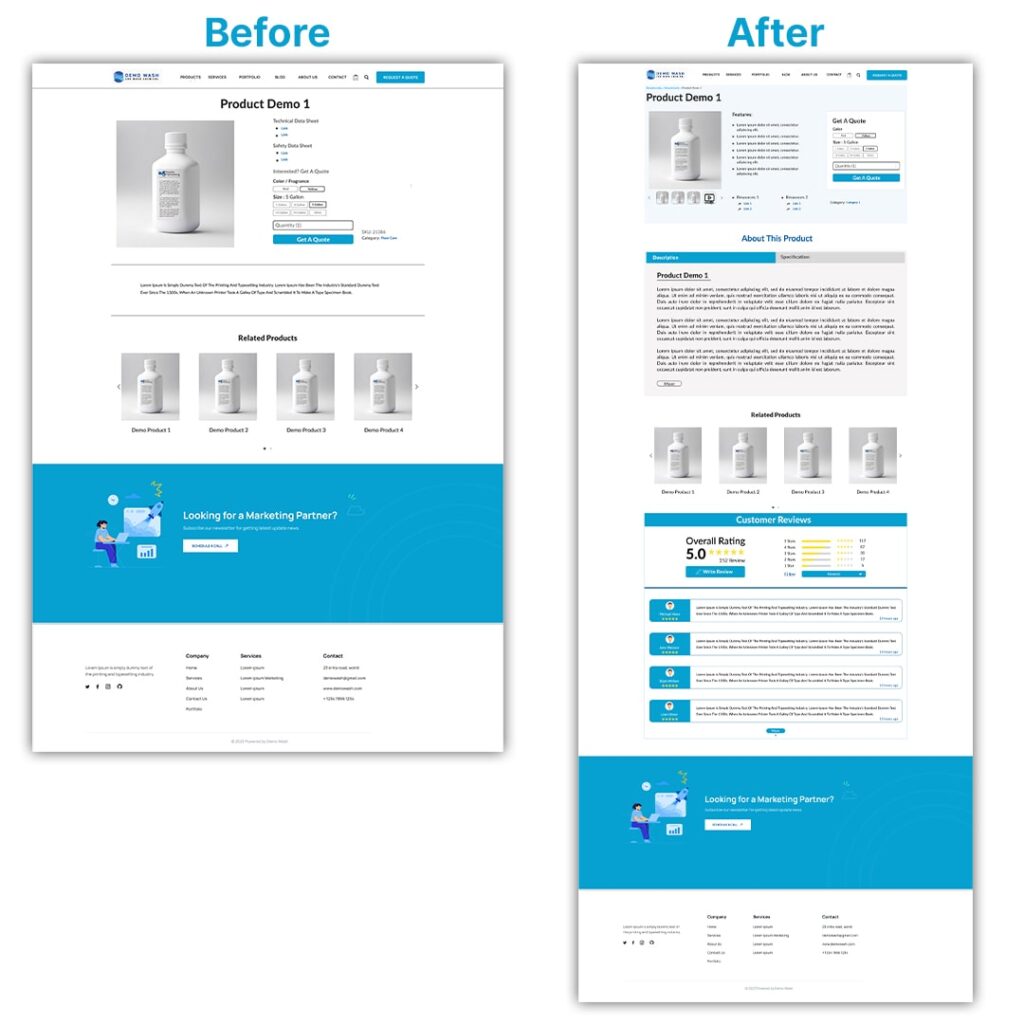The importance of PPC keywords cannot be overstated when you are creating a successful digital marketing campaign. These carefully chosen keywords serve as the cornerstone of pay-per-click advertising. They directly impact how and where your ads will appear online.
By selecting relevant and high-performing keywords, businesses can effectively target their audience, increase brand visibility. And thus they drive traffic to their website, ultimately leading to higher conversion rates.
Moreover, finding which keywords a website is using for PPC goes beyond simply choosing popular terms. It requires in-depth research into user intent and behavior. By analyzing the search queries that trigger ad impressions and clicks, businesses can gain valuable insights into customer preferences. That will tailor their marketing strategies accordingly.
In this article, we have covered what PPC keywords are, why you need to identify them and how to do it successfully.

Why Should You Find Which Keywords a Website is Using for PPC Compared to Your Competitors?
In the competitive world of online advertising, knowing your competitors’ PPC keywords can give you a strategic edge. Understanding which keywords are driving traffic to their websites means to identify new opportunities for targeting and bidding.
This valuable insight allows you to optimize your own PPC campaigns. Then, you can adjust your keyword targeting, and refine your ad copy. That’s how you better position your business in the market.
Moreover, analyzing competitors’ PPC keywords can provide valuable insights into consumer behavior and market trends. By studying the keywords that are driving traffic to your competitors’ sites, you can gain a deeper understanding of what resonates with potential customers. That will help you tailor your sure success strategy. This not only helps in improving the effectiveness of your paid advertising efforts but also aids in refining your overall marketing strategy. You do it by staying abreast of evolving industry trends. Understanding what’s working for your competitors can be an essential step towards boosting performance. That will also enable you staying ahead in today’s dynamic digital landscape.
Getting Started: Brainstorming a PPC Keyword List
When it comes to brainstorming a PPC keyword list, it’s important to start by understanding your target audience and their search behavior. Consider the pain points, desires, and intentions of your potential customers when they’re searching for your product or service. This will help you to create a keyword list that is relevant and resonates with your audience’s needs.
Next, leverage tools like Google Keyword Planner, SEMrush, or Ahrefs to research and identify high-performing keywords in your industry. Look for long-tail keywords that are more specific and have less competition, as these can often result in higher conversion rates. Additionally, analyze the keywords that your competitors are bidding on to gain insights into what is working within your niche.
Finally, stay agile with your PPC keyword list by continuously testing and refining it based on performance data. You should monitor which keywords are driving traffic and conversions while also identifying any low-performing ones. By staying proactive in optimizing your keyword list, you can ensure that your PPC campaigns remain relevant and effective in reaching your business goals.

Understand User Search Intent
Understanding user search intent is crucial for businesses looking to boost their online presence. It’s not just about the keywords that a website uses for PPC, but also about deciphering what users are actually looking for when they enter those keywords. By understanding the intent behind a user’s search query, businesses can modify their content and advertising strategies. Consequently, it will provide the most relevant and valuable results.
When businesses take the time to understand user search intent, they can better anticipate and meet the needs of potential customers. This could mean creating more targeted ad campaigns and improving website content to align with specific user queries. It could also mean developing products and services that directly address common search intents. Ultimately, this approach can lead to higher conversion rates and increased customer satisfaction. An improved overall business performance in the online marketplace is your reap here.
How to Find Your Competitors’ PPC Keywords
You can utilize multiple strategies to uncover your competitors’ PPC keywords. Thus, you can gain a competitive edge in the paid search landscape. As already said, understanding what keywords your rivals are bidding on helps inform and enhance your own keyword strategy. Besides, it enables you to stay ahead of industry trends and consumer behavior shifts. All these, ultimately, lead to more effective PPC campaigns and improved ROI. Here is how to do it:
Step #1: Find Your Competitors
In the world of digital advertising, identifying your competitors is a critical first step in crafting a successful PPC strategy. Begin by conducting thorough research across various search engines and social media platforms. This is the way to pinpoint who your primary competitors are in the online space.
Highly efficient, Google Keyword Planner or SEMrush can gain you deep insights into competitor’s paid keywords, ad copies, and estimated bids. By analyzing their keyword choices and campaign tactics, you can uncover valuable information about their targeting strategies and potential market gaps. Without failure, that you can leverage you to enhance your own PPC efforts.
Remember; don’t overlook the power of customer reviews and feedback on competitor ads. They can help you discover key insights on what’s resonating with their audience. These direct insights into customer preferences coupled with thorough competitive analysis can help shape a robust PPC campaign. And that effectively targets audience segments while differentiating your offerings from those of your rivals.

Step #2: Discover PPC Keywords
In the quest to uncover your competitors’ PPC keywords, it’s crucial to delve into the minds of your target audience. Understanding their search intent and preferences can offer invaluable insights for refining your keyword strategy.
You better look beyond generic keywords and explore long-tail variations that align with specific user queries and behaviors. These less competitive but highly relevant keywords can drive more targeted traffic to your site while reducing advertising costs.
Moreover, leverage modern tools like keyword research platforms and competitor analysis software to gain a comprehensive view of your industry landscape. By identifying high-performing keywords targeted by competitors, you can refine and optimize your own campaigns for maximum impact.
On its top, continuous monitoring of industry trends and consumer behavior can help you adapt your keyword strategy dynamically. Furthermore, it will ensure relevance and efficacy in an ever-evolving digital marketing landscape. This proactive approach can give you a competitive edge and enhance the efficiency of your PPC campaigns.
Step #3: Create a campaign based on competitors’ PPC keywords
In Step 3 of finding your competitors’ PPC keywords, it’s time to turn the tables and use their data to your advantage. By analyzing your competitors’ PPC campaigns, you can extract valuable insights into which keywords are driving traffic and conversions for them. With this information in hand, you can create a targeted campaign that strategically targets these high-performing keywords. That will surely put your brand in front of the same audience.
However, it’s crucial not to simply replicate your competitors’ campaigns literally. Instead, use their keywords as a starting point to conduct thorough research and identify additional relevant terms specific to your business. This approach allows you to leverage the success of your competitors while maintaining originality and relevance in your own campaign.
Tap into their keyword strategy while adding unique value propositions, offers, or ad copy tailored specifically for your brand. Thus, you can edge ahead in the competitive landscape of paid search advertising.

Sorting and Organizing Your PPC Keywords
Organizing and sorting your PPC keywords is a critical step in optimizing your digital marketing strategy. It is smart and effective to categorizing your keywords based on relevance, intent, and performance. Thus how you can streamline your ad campaigns and improve their effectiveness.
You can utilize keyword grouping tools and techniques such as match type segmentation. This way, you can help you create more targeted ad groups, resulting in higher click-through rates and lower cost per click.
In addition to organizing keywords by relevance, it’s essential to leverage negative keywords to filter out irrelevant traffic. By regularly reviewing search term reports and identifying irrelevant queries, you can refine your keyword list. As a result, you can make sure that your ads are only being displayed to the most qualified audience.
Furthermore, consider using dynamic keyword insertion to tailor ad copy based on users’ search queries. That is a sure-success method to maximize relevance and increasing the likelihood of conversions. Ultimately, a well-organized PPC keyword strategy not only boosts business but also optimizes advertising spend while delivering better results.
Leveraging PPC Keywords for Business Success
Leveraging PPC keywords is an essential strategy for achieving business success in today’s digital landscape. By conducting thorough research and analysis to identify the most effective keywords for PPC campaigns, businesses can optimize their online presence and attract quality traffic to their websites.
Furthermore, continually monitoring and refining keyword strategies allow companies to stay ahead of competitors. Moreover, this can maximize the ROI from their advertising spend.
Understanding the intent behind specific keywords enables businesses to tailor their messaging and offers in line with what potential customers are actively searching for. This personalized approach not only increases the likelihood of conversion but also enhances overall user experience.
As a result, finding which keywords a website is using for PPC becomes a key driver in propelling business growth by connecting with relevant audiences. And ultimately, it drives targeted traffic that converts into leads or sales.
FAQ
One of the most effective ways to find keywords for PPC is to start by brainstorming a list of relevant terms and phrases that align with your business goals and target audience. Utilize tools like Google Keyword Planner, SEMrush, or Ahrefs to validate your initial list and uncover additional keyword opportunities.
It’s essential to consider search volume, competition level, and cost-per-click data when narrowing down your keyword selection to ensure optimal performance.
One effective way to find out what keywords a website is using for PPC is to utilize online tools such as SEMrush, Ahrefs, or Google AdWords Keyword Planner. These tools allow you to input the website’s URL and analyze which keywords are driving traffic and conversions.
Another method to uncover a website’s keywords is through manual inspection of their page source code. By right-clicking on the webpage and selecting View Page Source, you can search for meta tags, header tags, and other HTML elements that contain keyword information.
When looking to uncover the keywords your competitors are using for PPC, there are several effective methods to consider. One approach involves utilizing keyword research tools such as SEMrush or Ahrefs. They can provide valuable insight into the specific keywords driving traffic to your competitor’s website.
Another method is to conduct a comprehensive analysis of your competitor’s ad copy and landing pages through platforms like SpyFu or iSpionage. By examining their advertising content, you can gain a clearer understanding of the keywords they are targeting.








